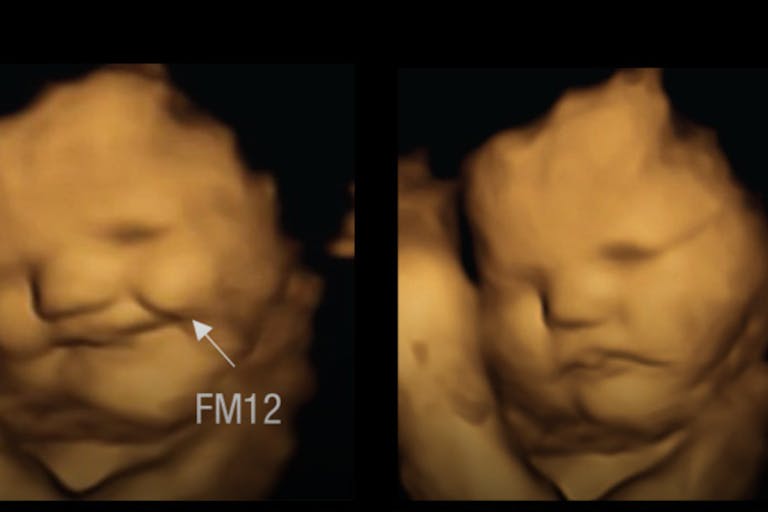These images from researchers show that babies in the womb can possibly react to flavor.

Study reveals preborn babies show preferences for certain foods in the womb
Study reveals preborn babies show preferences for certain foods in the womb
A recent report sheds new insight on life in the womb, showing that preborn children may demonstrate certain taste preferences before they’re born.
Researchers at Durham University in northeast England conducted the study on preborn babies, aged between 32 and 36 weeks gestation, using 4-D ultrasound technology. They found that many of the preborn babies exhibited sad or disgusted faces when fed kale, while the majority seemed to smile after their mother ate carrots.
“A number of studies have suggested that babies can taste and smell in the womb, but they are based on post-birth outcomes while our study is the first to see these reactions prior to birth,” said lead postgraduate researcher Beyza Ustun. “As a result, we think that this repeated exposure to flavors before birth could help to establish food preferences post-birth, which could be important when thinking about messaging around healthy eating and the potential for avoiding ‘food-fussiness’ when weaning.”
READ: Preborn babies ‘sing’ to Mozart, Christmas carols, and Mickey Mouse
The study is yet another sign that the preborn child is a unique individual with his own likes and dislikes — even before he’s born.
The report also demonstrated the double standard so prevalent in today’s media. Many news outlets, including CBS and the TODAY Show, shared the remarkable findings on social media. TODAY even referred to the preborn children as “babies in the womb” — a term that denotes their humanity.
In response, pro-lifers were quick to point out that while the media’s praise of the study confirms the humanity of preborn children, those same media outlets often push for abortion.
Article continues below
Dear Reader,
In 2026, Live Action is heading straight where the battle is fiercest: college campuses.
We have a bold initiative to establish 100 Live Action campus chapters within the next year, and your partnership will make it a success!
Your support today will help train and equip young leaders, bring Live Action’s educational content into academic environments, host on-campus events and debates, and empower students to challenge the pro-abortion status quo with truth and compassion.
Invest in pro-life grassroots outreach and cultural formation with your DOUBLED year-end gift!
But we are to believe they can’t feel pain and that dismembering or suctioning them to death is just a choice someone can make about their own life.
Fetuses are big fans of carrots but not leafy green vegetables – and you can tell by the look on their faces. cbsn.ws/3QZ4m7X
CBS News tweeted about the study, saying, “Fetuses are big fans of carrots but not leafy green vegetables — and you can tell by the look on their faces.”
One Twitter user, @theladykatie, noted the irony of the CBS tweet, saying, “But we are to believe they can’t feel pain and that dismembering or suctioning them to death is just a choice someone can make about their own life.”
“It’s almost like they’re humans and therefore have senses and stuff,” tweeted the musical artist Zuby. “Almost there.”
It's almost like they're humans and therefore have senses and emotions and stuff... Almost there.
Many other commenters pointed out the obvious implications of the study — that preborn children are developed, living beings, with their own preferences, likes, and dislikes. Yet many abortion advocates continue to rally for the death of these very children, on-demand, up until the point of birth.

Children aged 32 to 26 weeks, like those in the study, are able to be legally aborted in some states. In such cases, they are often subjected to induction abortions, a horrific procedure which takes two to three days to complete. According to the video above, on the first day, the woman takes mifepristone, which starves the child of nutrients. The child is also injected with digoxin, a drug that causes cardiac arrest. Following the digoxin injection, the child usually dies within 24 hours. Within 24 to 36 hours after the dose of mifepristone, the woman takes misoprostol, which causes her to go into labor and deliver her stillborn child.
It makes no sense to say that preborn babies who can feel pain, make facial expressions, and distinguish the taste differences of various foods should also face death by lethal injection or by dismemberment. Despite the fact that the abortion industry continues to downplay the reality of abortion, there is no denying the humanity of preborn children.
“Like” Live Action News on Facebook for more pro-life news and commentary!
Live Action News is pro-life news and commentary from a pro-life perspective.
Contact editor@liveaction.org for questions, corrections, or if you are seeking permission to reprint any Live Action News content.
Guest Articles: To submit a guest article to Live Action News, email editor@liveaction.org with an attached Word document of 800-1000 words. Please also attach any photos relevant to your submission if applicable. If your submission is accepted for publication, you will be notified within three weeks. Guest articles are not compensated (see our Open License Agreement). Thank you for your interest in Live Action News!
Read Next

Illinois bishops file amicus brief in opposition of abortion referral mandate
Cassy Cooke
·More In Media

Media
'Meet Baby Oliver': A Scientific Journey Into Life’s First Days
Cassy Cooke
·
Media
Live Action's 'Beyond Ultrasound' video dives deeper into human prenatal development
Cassy Cooke
·
Human Interest
Conceived in Rape: A mother and daughter tell their powerful story
Kelli Keane
·
Analysis
Sex-ed group likens 'Baby Olivia' video to horror film 'Rosemary's Baby'
Sheena Rodriguez
·
Analysis
WATCH: Rape survivors and people conceived in rape meet 'Face to Face'
Cassy Cooke
·More From Bridget Sielicki

Human Rights
Abortion activist secures removal of pro-life billboards in British Columbia
Bridget Sielicki
·
International
Türkiye experiencing 'demographic disaster' as birth rates plummet
Bridget Sielicki
·
International
Woman considering MAID because she can't access treatment in Canada
Bridget Sielicki
·
Politics
Indiana appeals court upholds injunction on release of abortion reports
Bridget Sielicki
·
Issues
SHOCK REPORT: New South Wales averages 20 'assisted deaths' weekly
Bridget Sielicki
·